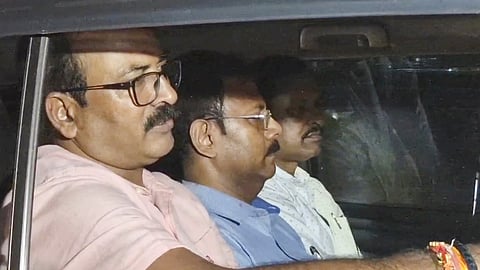

NEW DELHI: The Supreme Court on Friday dismissed the petition of Sandip Ghosh, the former Principal of R G Kar Medical College and Hospital, challenging the Calcutta High Court’s order directing a Central Bureau of Investigation (CBI) probe against him.
Ghosh had argued that the High Court had not heard his side before passing the decision.
This ruling marks a significant setback for Ghosh, who is currently in CBI custody. He faces serious allegations of financial and administrative misconduct as well as mishandling the rape and murder case of a 31-year-old trainee medico that occurred during his tenure.
On August 9, the woman doctor was brutally raped and murdered within the hospital premises. Ghosh contended that the High Court’s order directing a CBI probe into alleged corruption, while excluding him from the proceedings, was flawed.
A three-judge bench of the Supreme Court, comprising Chief Justice of India (CJI) D. Y. Chandrachud and Justices J. B. Pardiwala and Manoj Misra, rejected Ghosh’s petition.
"As an accused, you have no locus to intervene in the PIL, where the Calcutta high court is monitoring the investigation," the bench said.
The bench noted that Ghosh lacked locus standi in a Public Interest Litigation (PIL) seeking a probe into corruption related to the disposal of biomedical waste. It observed that both the rape-murder and corruption cases are under CBI investigation. “Let the CBI give us a status report,” the bench stated.
Senior advocate Meenakshi Arora, representing Ghosh, argued that the financial irregularities and misconduct cases should be investigated separately by the CBI. However, Solicitor General Tushar Mehta and Additional Solicitor General S. V. Raju, representing the CBI, opposed this, asserting that an accused cannot dictate the course of an investigation. The CJI concurred, noting that neither the court nor the accused could influence the investigation's direction.
Following his arrest by the CBI on September 4, Ghosh approached the Supreme Court, claiming that the Calcutta High Court had failed to consider his perspective before ordering the CBI probe. He also contended that the High Court’s connection of the rape incident with corruption was baseless.
On August 23, the Calcutta High Court had ordered a CBI investigation into the corruption allegations against Ghosh, citing prima facie evidence of serious violations and irregularities. The court directed that a single agency handle the investigation to ensure coherence.
The Supreme Court had previously taken suo motu cognizance of the brutal rape and murder incident. The Court criticized the delay in FIR registration and inconsistencies in the police’s handling of the case.
The CBI's status report indicated that the crime scene at R G Kar Medical College and Hospital was compromised. Initially, the state police had told the victim’s family that it was a suicide, but later reclassified it as murder. The Supreme Court expressed concerns about the West Bengal police's handling of the case, with Justice Pardiwala remarking on the unusual procedural lapses encountered in his long judicial career.
The Court was particularly troubled by the delayed sealing of the crime scene and the destruction of evidence, despite the body being discovered in the morning. It found the Kolkata Police’s inaction and delay in registering the case of the woman doctor’s unnatural death “extremely disturbing.” The Supreme Court questioned the timing of legal formalities, noting the postmortem was conducted between 6:10 pm and 7:10 pm on August 9, prior to the registration of the case.